Introduction to Guidance and Counselling
VerifiedAdded on 2022/12/27
|11
|3789
|139
AI Summary
This document provides an introduction to guidance and counselling, discussing the stages of counselling in the context of mental health promotion. It also explains the use of simulation techniques to illustrate the first and second stages of counselling, and highlights the five attributes of an effective counsellor and their importance in the counselling process.
Contribute Materials
Your contribution can guide someone’s learning journey. Share your
documents today.
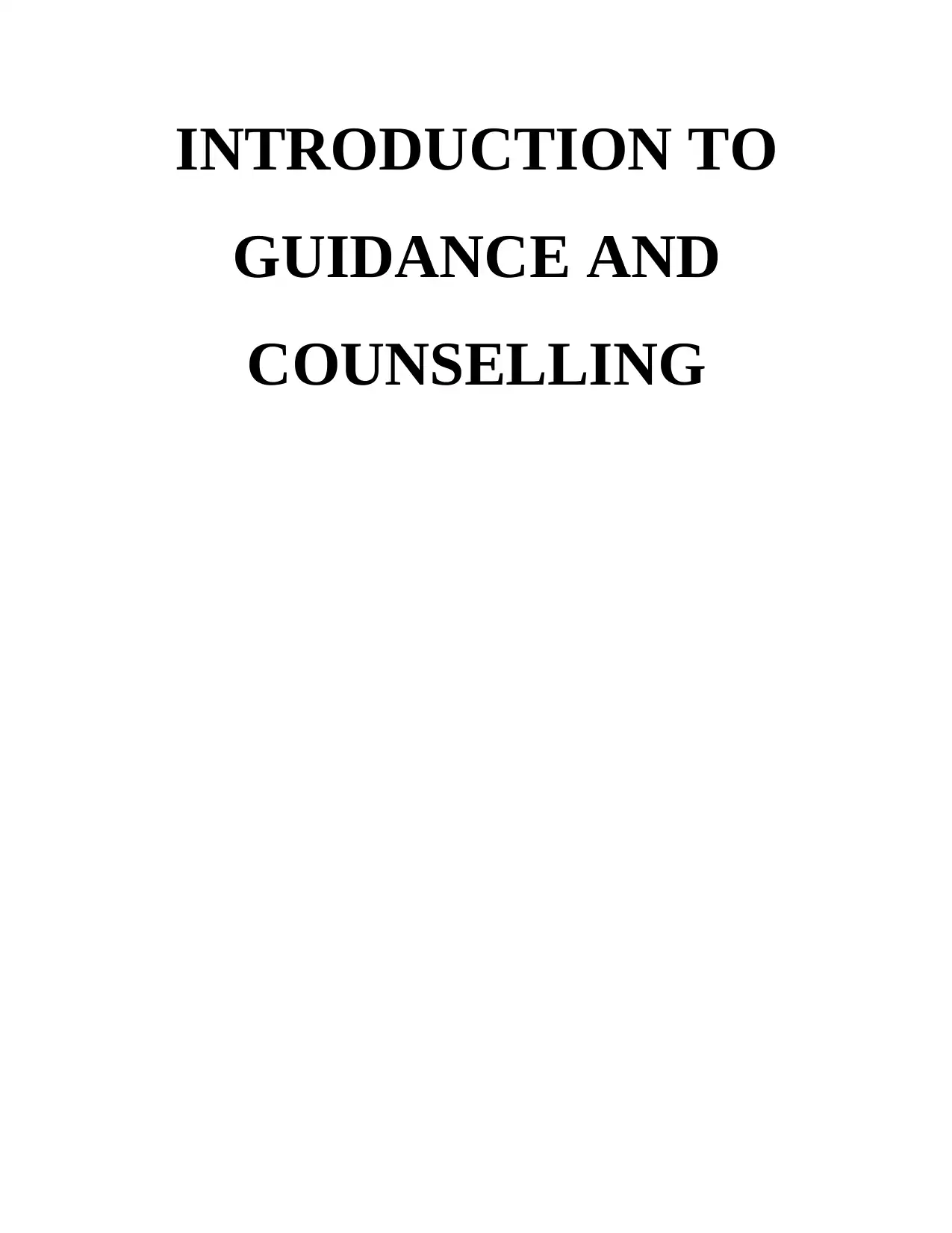
INTRODUCTION TO
GUIDANCE AND
COUNSELLING
GUIDANCE AND
COUNSELLING
Secure Best Marks with AI Grader
Need help grading? Try our AI Grader for instant feedback on your assignments.
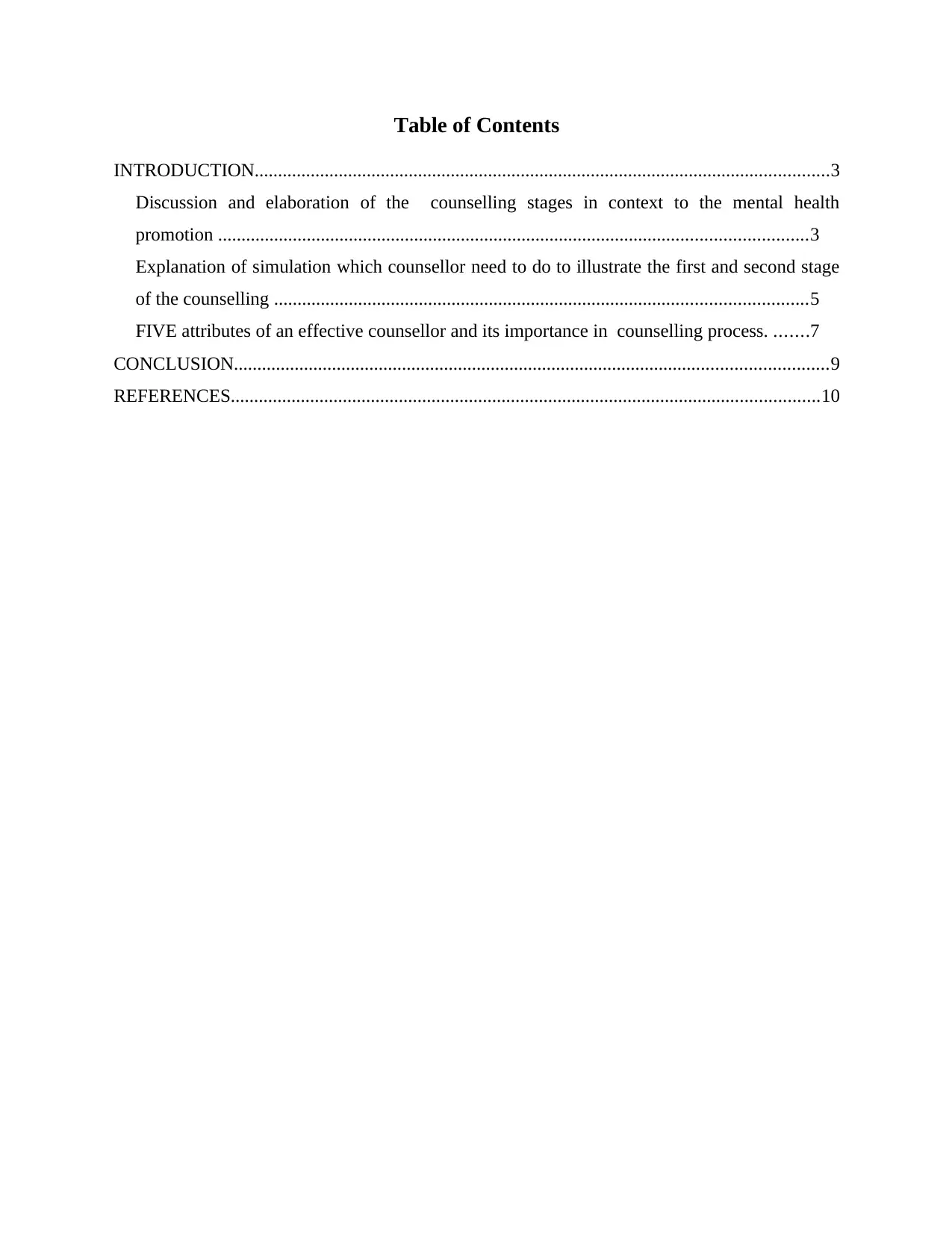
Table of Contents
INTRODUCTION...........................................................................................................................3
Discussion and elaboration of the counselling stages in context to the mental health
promotion ..............................................................................................................................3
Explanation of simulation which counsellor need to do to illustrate the first and second stage
of the counselling ..................................................................................................................5
FIVE attributes of an effective counsellor and its importance in counselling process. .......7
CONCLUSION...............................................................................................................................9
REFERENCES..............................................................................................................................10
INTRODUCTION...........................................................................................................................3
Discussion and elaboration of the counselling stages in context to the mental health
promotion ..............................................................................................................................3
Explanation of simulation which counsellor need to do to illustrate the first and second stage
of the counselling ..................................................................................................................5
FIVE attributes of an effective counsellor and its importance in counselling process. .......7
CONCLUSION...............................................................................................................................9
REFERENCES..............................................................................................................................10
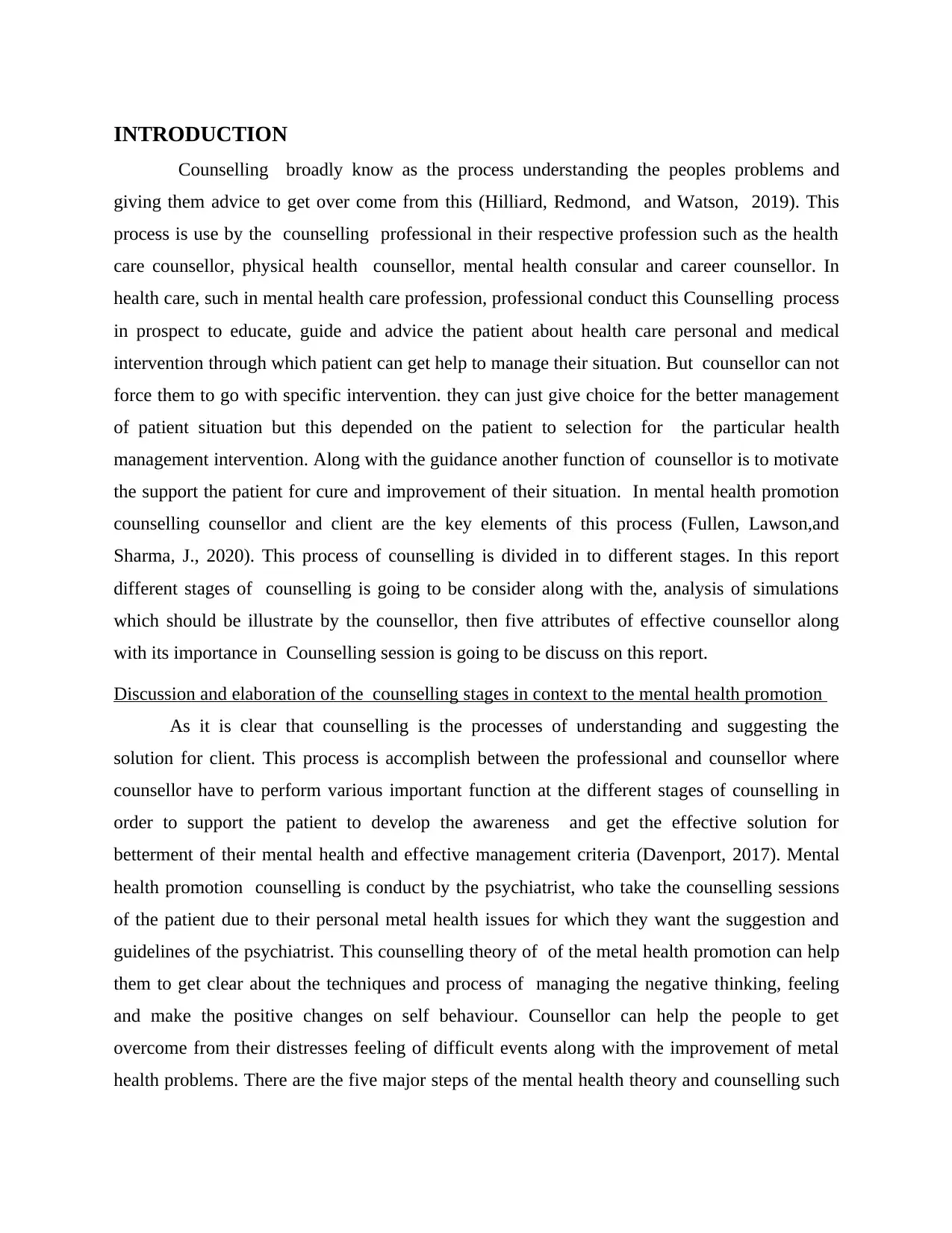
INTRODUCTION
Counselling broadly know as the process understanding the peoples problems and
giving them advice to get over come from this (Hilliard, Redmond, and Watson, 2019). This
process is use by the counselling professional in their respective profession such as the health
care counsellor, physical health counsellor, mental health consular and career counsellor. In
health care, such in mental health care profession, professional conduct this Counselling process
in prospect to educate, guide and advice the patient about health care personal and medical
intervention through which patient can get help to manage their situation. But counsellor can not
force them to go with specific intervention. they can just give choice for the better management
of patient situation but this depended on the patient to selection for the particular health
management intervention. Along with the guidance another function of counsellor is to motivate
the support the patient for cure and improvement of their situation. In mental health promotion
counselling counsellor and client are the key elements of this process (Fullen, Lawson,and
Sharma, J., 2020). This process of counselling is divided in to different stages. In this report
different stages of counselling is going to be consider along with the, analysis of simulations
which should be illustrate by the counsellor, then five attributes of effective counsellor along
with its importance in Counselling session is going to be discuss on this report.
Discussion and elaboration of the counselling stages in context to the mental health promotion
As it is clear that counselling is the processes of understanding and suggesting the
solution for client. This process is accomplish between the professional and counsellor where
counsellor have to perform various important function at the different stages of counselling in
order to support the patient to develop the awareness and get the effective solution for
betterment of their mental health and effective management criteria (Davenport, 2017). Mental
health promotion counselling is conduct by the psychiatrist, who take the counselling sessions
of the patient due to their personal metal health issues for which they want the suggestion and
guidelines of the psychiatrist. This counselling theory of of the metal health promotion can help
them to get clear about the techniques and process of managing the negative thinking, feeling
and make the positive changes on self behaviour. Counsellor can help the people to get
overcome from their distresses feeling of difficult events along with the improvement of metal
health problems. There are the five major steps of the mental health theory and counselling such
Counselling broadly know as the process understanding the peoples problems and
giving them advice to get over come from this (Hilliard, Redmond, and Watson, 2019). This
process is use by the counselling professional in their respective profession such as the health
care counsellor, physical health counsellor, mental health consular and career counsellor. In
health care, such in mental health care profession, professional conduct this Counselling process
in prospect to educate, guide and advice the patient about health care personal and medical
intervention through which patient can get help to manage their situation. But counsellor can not
force them to go with specific intervention. they can just give choice for the better management
of patient situation but this depended on the patient to selection for the particular health
management intervention. Along with the guidance another function of counsellor is to motivate
the support the patient for cure and improvement of their situation. In mental health promotion
counselling counsellor and client are the key elements of this process (Fullen, Lawson,and
Sharma, J., 2020). This process of counselling is divided in to different stages. In this report
different stages of counselling is going to be consider along with the, analysis of simulations
which should be illustrate by the counsellor, then five attributes of effective counsellor along
with its importance in Counselling session is going to be discuss on this report.
Discussion and elaboration of the counselling stages in context to the mental health promotion
As it is clear that counselling is the processes of understanding and suggesting the
solution for client. This process is accomplish between the professional and counsellor where
counsellor have to perform various important function at the different stages of counselling in
order to support the patient to develop the awareness and get the effective solution for
betterment of their mental health and effective management criteria (Davenport, 2017). Mental
health promotion counselling is conduct by the psychiatrist, who take the counselling sessions
of the patient due to their personal metal health issues for which they want the suggestion and
guidelines of the psychiatrist. This counselling theory of of the metal health promotion can help
them to get clear about the techniques and process of managing the negative thinking, feeling
and make the positive changes on self behaviour. Counsellor can help the people to get
overcome from their distresses feeling of difficult events along with the improvement of metal
health problems. There are the five major steps of the mental health theory and counselling such
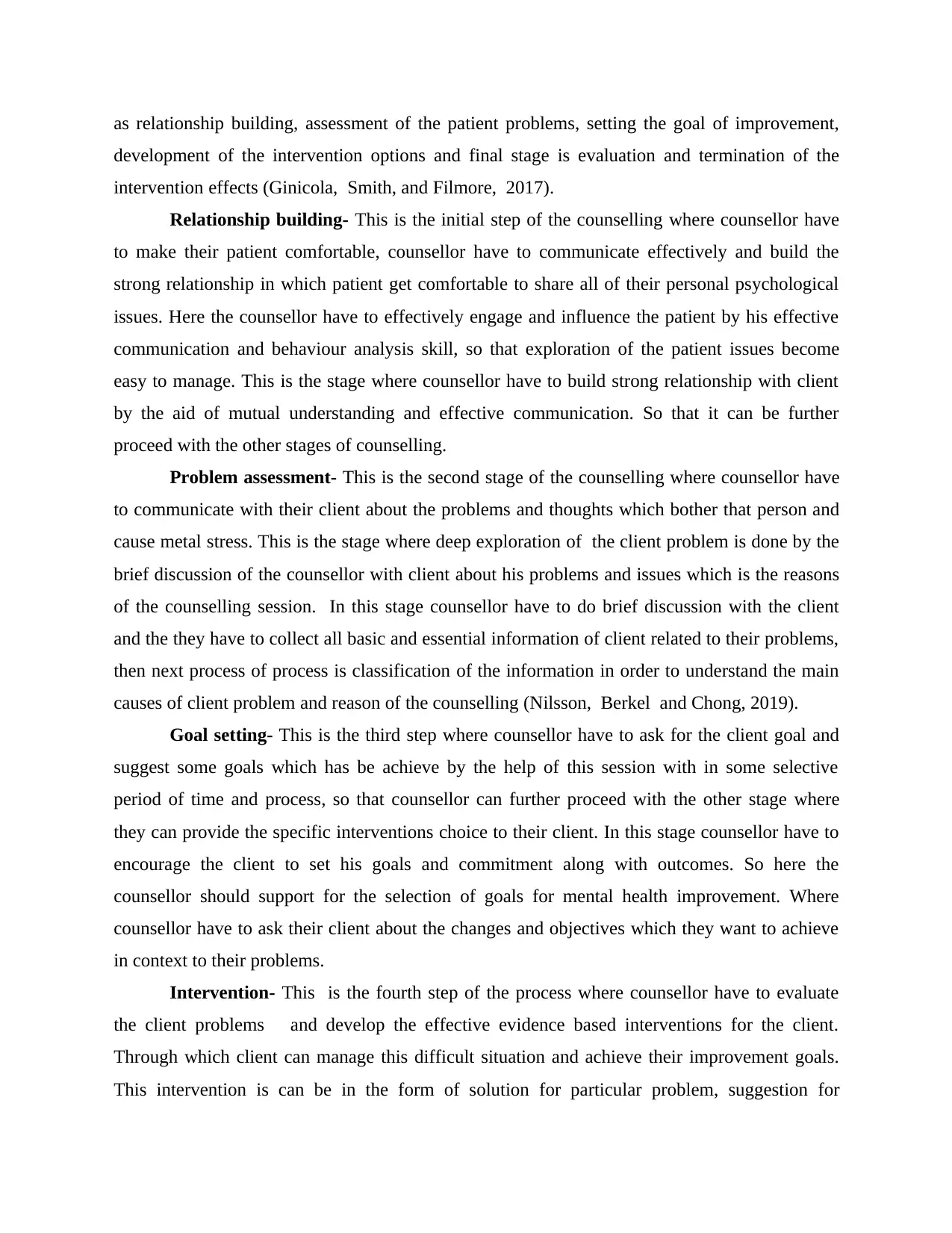
as relationship building, assessment of the patient problems, setting the goal of improvement,
development of the intervention options and final stage is evaluation and termination of the
intervention effects (Ginicola, Smith, and Filmore, 2017).
Relationship building- This is the initial step of the counselling where counsellor have
to make their patient comfortable, counsellor have to communicate effectively and build the
strong relationship in which patient get comfortable to share all of their personal psychological
issues. Here the counsellor have to effectively engage and influence the patient by his effective
communication and behaviour analysis skill, so that exploration of the patient issues become
easy to manage. This is the stage where counsellor have to build strong relationship with client
by the aid of mutual understanding and effective communication. So that it can be further
proceed with the other stages of counselling.
Problem assessment- This is the second stage of the counselling where counsellor have
to communicate with their client about the problems and thoughts which bother that person and
cause metal stress. This is the stage where deep exploration of the client problem is done by the
brief discussion of the counsellor with client about his problems and issues which is the reasons
of the counselling session. In this stage counsellor have to do brief discussion with the client
and the they have to collect all basic and essential information of client related to their problems,
then next process of process is classification of the information in order to understand the main
causes of client problem and reason of the counselling (Nilsson, Berkel and Chong, 2019).
Goal setting- This is the third step where counsellor have to ask for the client goal and
suggest some goals which has be achieve by the help of this session with in some selective
period of time and process, so that counsellor can further proceed with the other stage where
they can provide the specific interventions choice to their client. In this stage counsellor have to
encourage the client to set his goals and commitment along with outcomes. So here the
counsellor should support for the selection of goals for mental health improvement. Where
counsellor have to ask their client about the changes and objectives which they want to achieve
in context to their problems.
Intervention- This is the fourth step of the process where counsellor have to evaluate
the client problems and develop the effective evidence based interventions for the client.
Through which client can manage this difficult situation and achieve their improvement goals.
This intervention is can be in the form of solution for particular problem, suggestion for
development of the intervention options and final stage is evaluation and termination of the
intervention effects (Ginicola, Smith, and Filmore, 2017).
Relationship building- This is the initial step of the counselling where counsellor have
to make their patient comfortable, counsellor have to communicate effectively and build the
strong relationship in which patient get comfortable to share all of their personal psychological
issues. Here the counsellor have to effectively engage and influence the patient by his effective
communication and behaviour analysis skill, so that exploration of the patient issues become
easy to manage. This is the stage where counsellor have to build strong relationship with client
by the aid of mutual understanding and effective communication. So that it can be further
proceed with the other stages of counselling.
Problem assessment- This is the second stage of the counselling where counsellor have
to communicate with their client about the problems and thoughts which bother that person and
cause metal stress. This is the stage where deep exploration of the client problem is done by the
brief discussion of the counsellor with client about his problems and issues which is the reasons
of the counselling session. In this stage counsellor have to do brief discussion with the client
and the they have to collect all basic and essential information of client related to their problems,
then next process of process is classification of the information in order to understand the main
causes of client problem and reason of the counselling (Nilsson, Berkel and Chong, 2019).
Goal setting- This is the third step where counsellor have to ask for the client goal and
suggest some goals which has be achieve by the help of this session with in some selective
period of time and process, so that counsellor can further proceed with the other stage where
they can provide the specific interventions choice to their client. In this stage counsellor have to
encourage the client to set his goals and commitment along with outcomes. So here the
counsellor should support for the selection of goals for mental health improvement. Where
counsellor have to ask their client about the changes and objectives which they want to achieve
in context to their problems.
Intervention- This is the fourth step of the process where counsellor have to evaluate
the client problems and develop the effective evidence based interventions for the client.
Through which client can manage this difficult situation and achieve their improvement goals.
This intervention is can be in the form of solution for particular problem, suggestion for
Secure Best Marks with AI Grader
Need help grading? Try our AI Grader for instant feedback on your assignments.
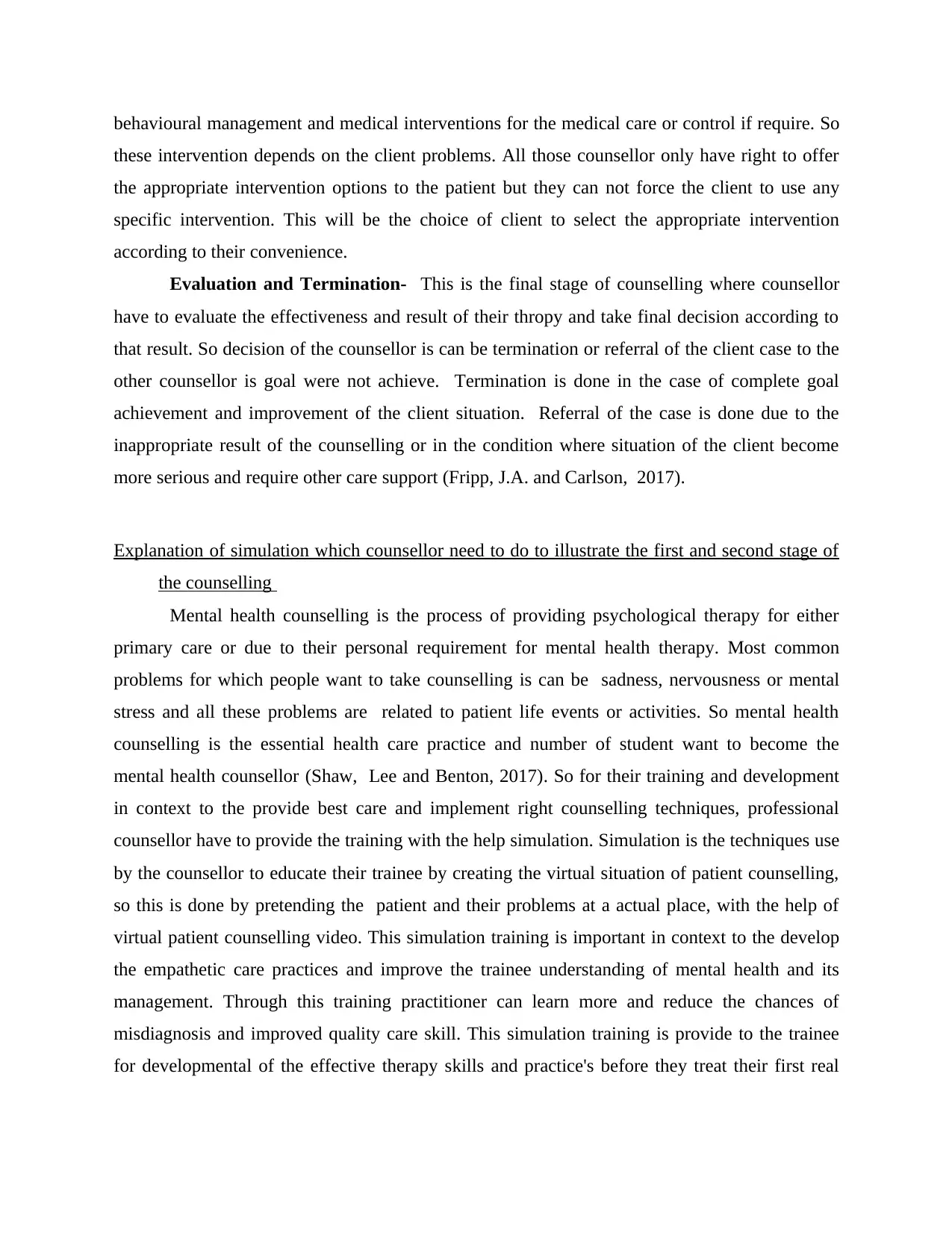
behavioural management and medical interventions for the medical care or control if require. So
these intervention depends on the client problems. All those counsellor only have right to offer
the appropriate intervention options to the patient but they can not force the client to use any
specific intervention. This will be the choice of client to select the appropriate intervention
according to their convenience.
Evaluation and Termination- This is the final stage of counselling where counsellor
have to evaluate the effectiveness and result of their thropy and take final decision according to
that result. So decision of the counsellor is can be termination or referral of the client case to the
other counsellor is goal were not achieve. Termination is done in the case of complete goal
achievement and improvement of the client situation. Referral of the case is done due to the
inappropriate result of the counselling or in the condition where situation of the client become
more serious and require other care support (Fripp, J.A. and Carlson, 2017).
Explanation of simulation which counsellor need to do to illustrate the first and second stage of
the counselling
Mental health counselling is the process of providing psychological therapy for either
primary care or due to their personal requirement for mental health therapy. Most common
problems for which people want to take counselling is can be sadness, nervousness or mental
stress and all these problems are related to patient life events or activities. So mental health
counselling is the essential health care practice and number of student want to become the
mental health counsellor (Shaw, Lee and Benton, 2017). So for their training and development
in context to the provide best care and implement right counselling techniques, professional
counsellor have to provide the training with the help simulation. Simulation is the techniques use
by the counsellor to educate their trainee by creating the virtual situation of patient counselling,
so this is done by pretending the patient and their problems at a actual place, with the help of
virtual patient counselling video. This simulation training is important in context to the develop
the empathetic care practices and improve the trainee understanding of mental health and its
management. Through this training practitioner can learn more and reduce the chances of
misdiagnosis and improved quality care skill. This simulation training is provide to the trainee
for developmental of the effective therapy skills and practice's before they treat their first real
these intervention depends on the client problems. All those counsellor only have right to offer
the appropriate intervention options to the patient but they can not force the client to use any
specific intervention. This will be the choice of client to select the appropriate intervention
according to their convenience.
Evaluation and Termination- This is the final stage of counselling where counsellor
have to evaluate the effectiveness and result of their thropy and take final decision according to
that result. So decision of the counsellor is can be termination or referral of the client case to the
other counsellor is goal were not achieve. Termination is done in the case of complete goal
achievement and improvement of the client situation. Referral of the case is done due to the
inappropriate result of the counselling or in the condition where situation of the client become
more serious and require other care support (Fripp, J.A. and Carlson, 2017).
Explanation of simulation which counsellor need to do to illustrate the first and second stage of
the counselling
Mental health counselling is the process of providing psychological therapy for either
primary care or due to their personal requirement for mental health therapy. Most common
problems for which people want to take counselling is can be sadness, nervousness or mental
stress and all these problems are related to patient life events or activities. So mental health
counselling is the essential health care practice and number of student want to become the
mental health counsellor (Shaw, Lee and Benton, 2017). So for their training and development
in context to the provide best care and implement right counselling techniques, professional
counsellor have to provide the training with the help simulation. Simulation is the techniques use
by the counsellor to educate their trainee by creating the virtual situation of patient counselling,
so this is done by pretending the patient and their problems at a actual place, with the help of
virtual patient counselling video. This simulation training is important in context to the develop
the empathetic care practices and improve the trainee understanding of mental health and its
management. Through this training practitioner can learn more and reduce the chances of
misdiagnosis and improved quality care skill. This simulation training is provide to the trainee
for developmental of the effective therapy skills and practice's before they treat their first real
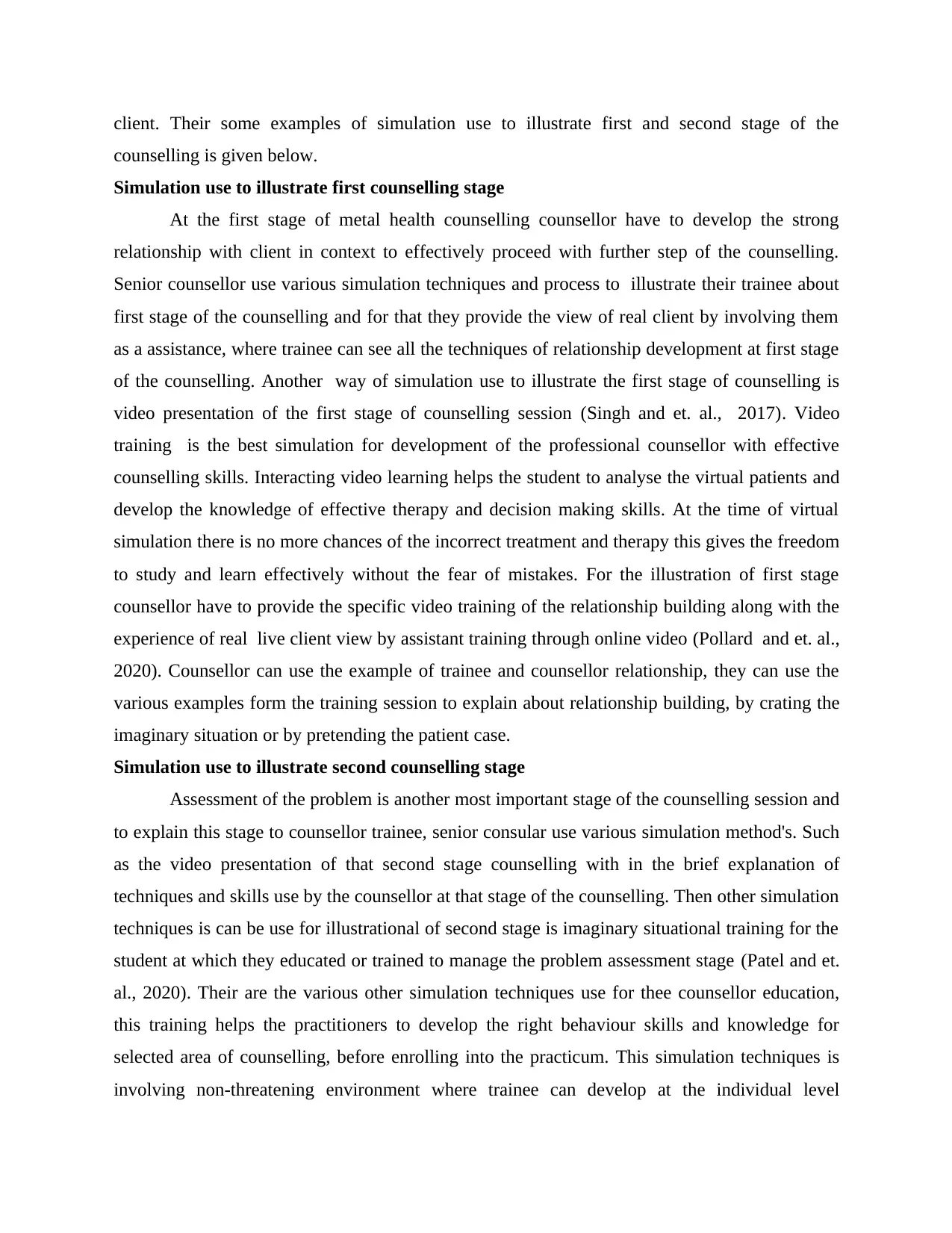
client. Their some examples of simulation use to illustrate first and second stage of the
counselling is given below.
Simulation use to illustrate first counselling stage
At the first stage of metal health counselling counsellor have to develop the strong
relationship with client in context to effectively proceed with further step of the counselling.
Senior counsellor use various simulation techniques and process to illustrate their trainee about
first stage of the counselling and for that they provide the view of real client by involving them
as a assistance, where trainee can see all the techniques of relationship development at first stage
of the counselling. Another way of simulation use to illustrate the first stage of counselling is
video presentation of the first stage of counselling session (Singh and et. al., 2017). Video
training is the best simulation for development of the professional counsellor with effective
counselling skills. Interacting video learning helps the student to analyse the virtual patients and
develop the knowledge of effective therapy and decision making skills. At the time of virtual
simulation there is no more chances of the incorrect treatment and therapy this gives the freedom
to study and learn effectively without the fear of mistakes. For the illustration of first stage
counsellor have to provide the specific video training of the relationship building along with the
experience of real live client view by assistant training through online video (Pollard and et. al.,
2020). Counsellor can use the example of trainee and counsellor relationship, they can use the
various examples form the training session to explain about relationship building, by crating the
imaginary situation or by pretending the patient case.
Simulation use to illustrate second counselling stage
Assessment of the problem is another most important stage of the counselling session and
to explain this stage to counsellor trainee, senior consular use various simulation method's. Such
as the video presentation of that second stage counselling with in the brief explanation of
techniques and skills use by the counsellor at that stage of the counselling. Then other simulation
techniques is can be use for illustrational of second stage is imaginary situational training for the
student at which they educated or trained to manage the problem assessment stage (Patel and et.
al., 2020). Their are the various other simulation techniques use for thee counsellor education,
this training helps the practitioners to develop the right behaviour skills and knowledge for
selected area of counselling, before enrolling into the practicum. This simulation techniques is
involving non-threatening environment where trainee can develop at the individual level
counselling is given below.
Simulation use to illustrate first counselling stage
At the first stage of metal health counselling counsellor have to develop the strong
relationship with client in context to effectively proceed with further step of the counselling.
Senior counsellor use various simulation techniques and process to illustrate their trainee about
first stage of the counselling and for that they provide the view of real client by involving them
as a assistance, where trainee can see all the techniques of relationship development at first stage
of the counselling. Another way of simulation use to illustrate the first stage of counselling is
video presentation of the first stage of counselling session (Singh and et. al., 2017). Video
training is the best simulation for development of the professional counsellor with effective
counselling skills. Interacting video learning helps the student to analyse the virtual patients and
develop the knowledge of effective therapy and decision making skills. At the time of virtual
simulation there is no more chances of the incorrect treatment and therapy this gives the freedom
to study and learn effectively without the fear of mistakes. For the illustration of first stage
counsellor have to provide the specific video training of the relationship building along with the
experience of real live client view by assistant training through online video (Pollard and et. al.,
2020). Counsellor can use the example of trainee and counsellor relationship, they can use the
various examples form the training session to explain about relationship building, by crating the
imaginary situation or by pretending the patient case.
Simulation use to illustrate second counselling stage
Assessment of the problem is another most important stage of the counselling session and
to explain this stage to counsellor trainee, senior consular use various simulation method's. Such
as the video presentation of that second stage counselling with in the brief explanation of
techniques and skills use by the counsellor at that stage of the counselling. Then other simulation
techniques is can be use for illustrational of second stage is imaginary situational training for the
student at which they educated or trained to manage the problem assessment stage (Patel and et.
al., 2020). Their are the various other simulation techniques use for thee counsellor education,
this training helps the practitioners to develop the right behaviour skills and knowledge for
selected area of counselling, before enrolling into the practicum. This simulation techniques is
involving non-threatening environment where trainee can develop at the individual level
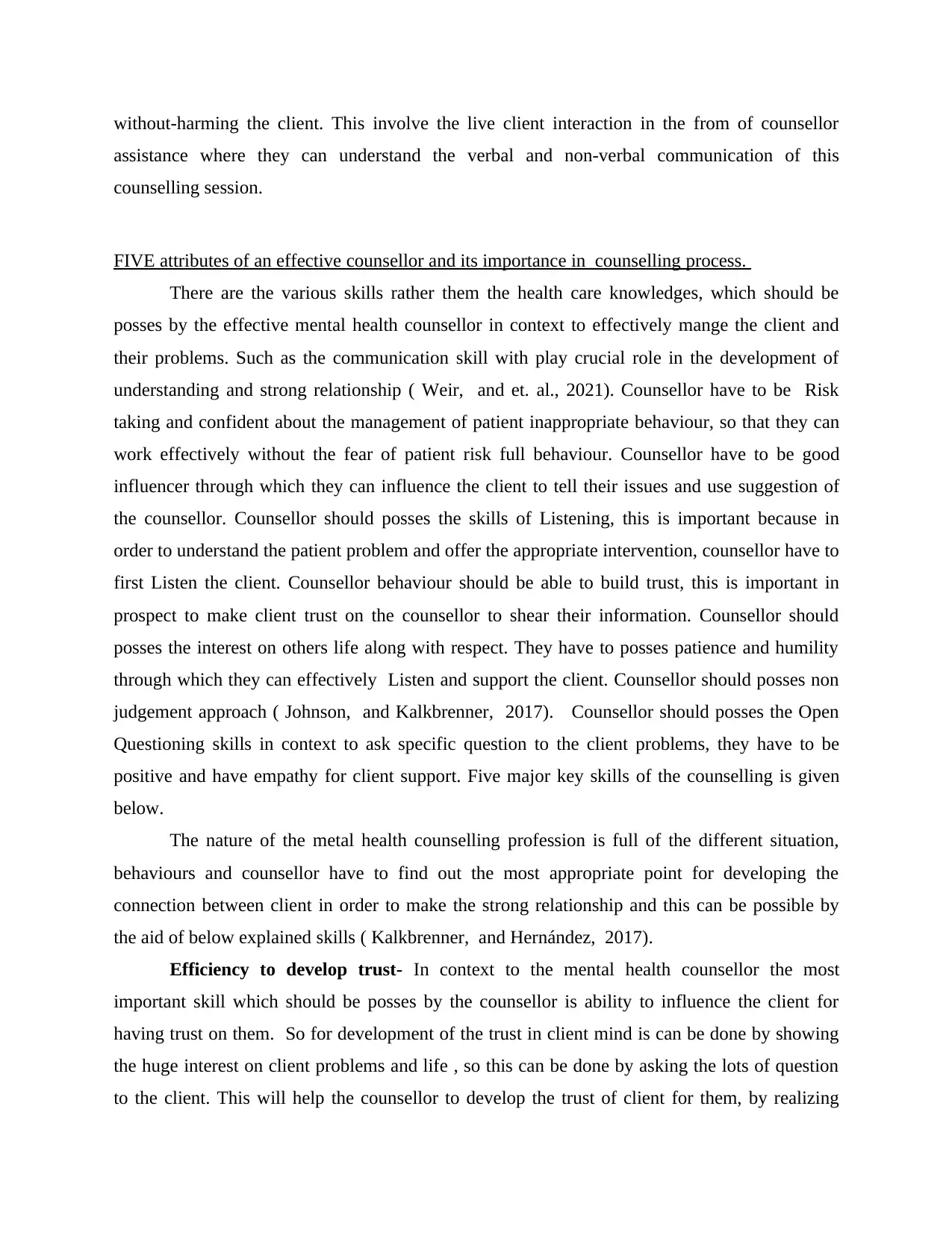
without-harming the client. This involve the live client interaction in the from of counsellor
assistance where they can understand the verbal and non-verbal communication of this
counselling session.
FIVE attributes of an effective counsellor and its importance in counselling process.
There are the various skills rather them the health care knowledges, which should be
posses by the effective mental health counsellor in context to effectively mange the client and
their problems. Such as the communication skill with play crucial role in the development of
understanding and strong relationship ( Weir, and et. al., 2021). Counsellor have to be Risk
taking and confident about the management of patient inappropriate behaviour, so that they can
work effectively without the fear of patient risk full behaviour. Counsellor have to be good
influencer through which they can influence the client to tell their issues and use suggestion of
the counsellor. Counsellor should posses the skills of Listening, this is important because in
order to understand the patient problem and offer the appropriate intervention, counsellor have to
first Listen the client. Counsellor behaviour should be able to build trust, this is important in
prospect to make client trust on the counsellor to shear their information. Counsellor should
posses the interest on others life along with respect. They have to posses patience and humility
through which they can effectively Listen and support the client. Counsellor should posses non
judgement approach ( Johnson, and Kalkbrenner, 2017). Counsellor should posses the Open
Questioning skills in context to ask specific question to the client problems, they have to be
positive and have empathy for client support. Five major key skills of the counselling is given
below.
The nature of the metal health counselling profession is full of the different situation,
behaviours and counsellor have to find out the most appropriate point for developing the
connection between client in order to make the strong relationship and this can be possible by
the aid of below explained skills ( Kalkbrenner, and Hernández, 2017).
Efficiency to develop trust- In context to the mental health counsellor the most
important skill which should be posses by the counsellor is ability to influence the client for
having trust on them. So for development of the trust in client mind is can be done by showing
the huge interest on client problems and life , so this can be done by asking the lots of question
to the client. This will help the counsellor to develop the trust of client for them, by realizing
assistance where they can understand the verbal and non-verbal communication of this
counselling session.
FIVE attributes of an effective counsellor and its importance in counselling process.
There are the various skills rather them the health care knowledges, which should be
posses by the effective mental health counsellor in context to effectively mange the client and
their problems. Such as the communication skill with play crucial role in the development of
understanding and strong relationship ( Weir, and et. al., 2021). Counsellor have to be Risk
taking and confident about the management of patient inappropriate behaviour, so that they can
work effectively without the fear of patient risk full behaviour. Counsellor have to be good
influencer through which they can influence the client to tell their issues and use suggestion of
the counsellor. Counsellor should posses the skills of Listening, this is important because in
order to understand the patient problem and offer the appropriate intervention, counsellor have to
first Listen the client. Counsellor behaviour should be able to build trust, this is important in
prospect to make client trust on the counsellor to shear their information. Counsellor should
posses the interest on others life along with respect. They have to posses patience and humility
through which they can effectively Listen and support the client. Counsellor should posses non
judgement approach ( Johnson, and Kalkbrenner, 2017). Counsellor should posses the Open
Questioning skills in context to ask specific question to the client problems, they have to be
positive and have empathy for client support. Five major key skills of the counselling is given
below.
The nature of the metal health counselling profession is full of the different situation,
behaviours and counsellor have to find out the most appropriate point for developing the
connection between client in order to make the strong relationship and this can be possible by
the aid of below explained skills ( Kalkbrenner, and Hernández, 2017).
Efficiency to develop trust- In context to the mental health counsellor the most
important skill which should be posses by the counsellor is ability to influence the client for
having trust on them. So for development of the trust in client mind is can be done by showing
the huge interest on client problems and life , so this can be done by asking the lots of question
to the client. This will help the counsellor to develop the trust of client for them, by realizing
Paraphrase This Document
Need a fresh take? Get an instant paraphrase of this document with our AI Paraphraser
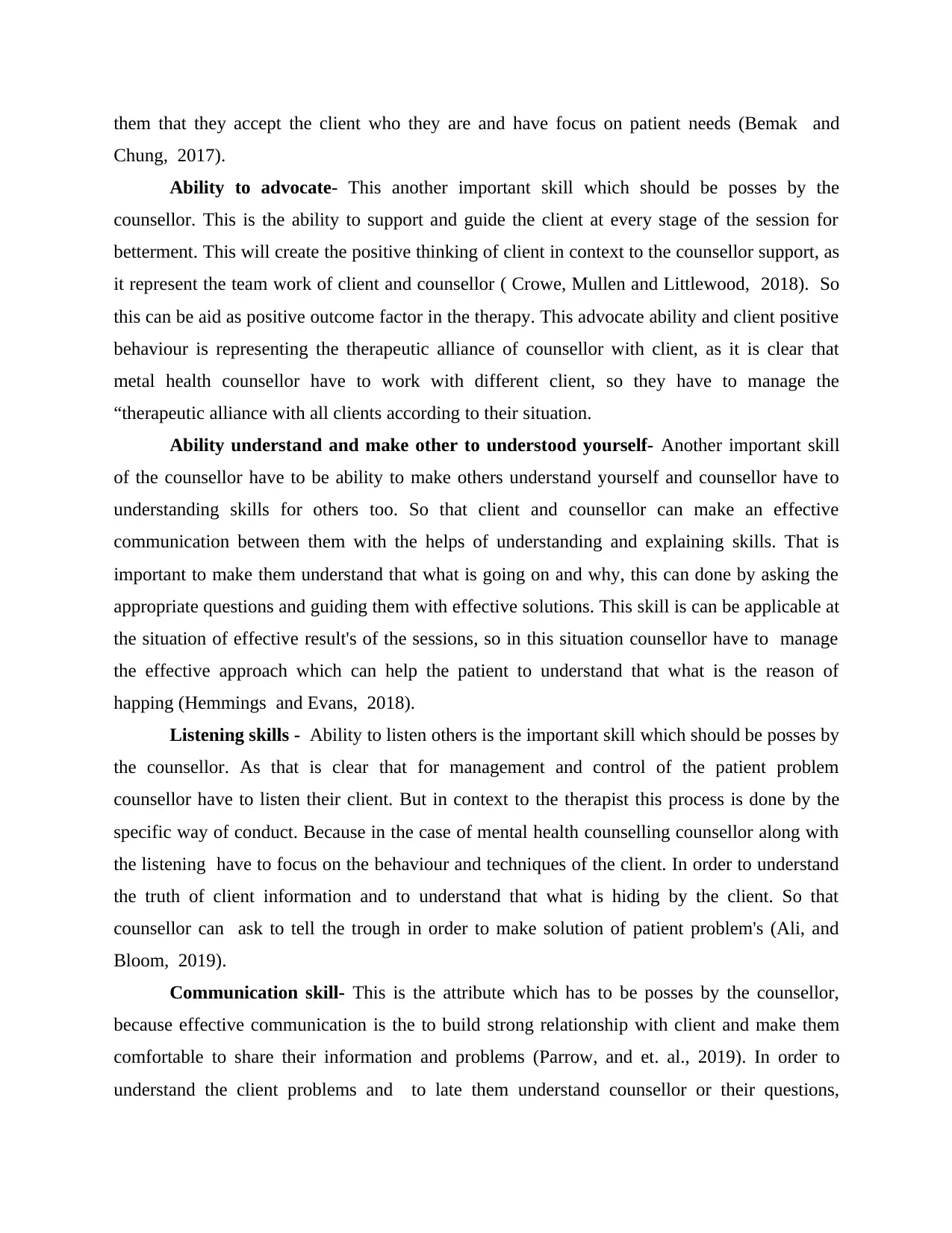
them that they accept the client who they are and have focus on patient needs (Bemak and
Chung, 2017).
Ability to advocate- This another important skill which should be posses by the
counsellor. This is the ability to support and guide the client at every stage of the session for
betterment. This will create the positive thinking of client in context to the counsellor support, as
it represent the team work of client and counsellor ( Crowe, Mullen and Littlewood, 2018). So
this can be aid as positive outcome factor in the therapy. This advocate ability and client positive
behaviour is representing the therapeutic alliance of counsellor with client, as it is clear that
metal health counsellor have to work with different client, so they have to manage the
“therapeutic alliance with all clients according to their situation.
Ability understand and make other to understood yourself- Another important skill
of the counsellor have to be ability to make others understand yourself and counsellor have to
understanding skills for others too. So that client and counsellor can make an effective
communication between them with the helps of understanding and explaining skills. That is
important to make them understand that what is going on and why, this can done by asking the
appropriate questions and guiding them with effective solutions. This skill is can be applicable at
the situation of effective result's of the sessions, so in this situation counsellor have to manage
the effective approach which can help the patient to understand that what is the reason of
happing (Hemmings and Evans, 2018).
Listening skills - Ability to listen others is the important skill which should be posses by
the counsellor. As that is clear that for management and control of the patient problem
counsellor have to listen their client. But in context to the therapist this process is done by the
specific way of conduct. Because in the case of mental health counselling counsellor along with
the listening have to focus on the behaviour and techniques of the client. In order to understand
the truth of client information and to understand that what is hiding by the client. So that
counsellor can ask to tell the trough in order to make solution of patient problem's (Ali, and
Bloom, 2019).
Communication skill- This is the attribute which has to be posses by the counsellor,
because effective communication is the to build strong relationship with client and make them
comfortable to share their information and problems (Parrow, and et. al., 2019). In order to
understand the client problems and to late them understand counsellor or their questions,
Chung, 2017).
Ability to advocate- This another important skill which should be posses by the
counsellor. This is the ability to support and guide the client at every stage of the session for
betterment. This will create the positive thinking of client in context to the counsellor support, as
it represent the team work of client and counsellor ( Crowe, Mullen and Littlewood, 2018). So
this can be aid as positive outcome factor in the therapy. This advocate ability and client positive
behaviour is representing the therapeutic alliance of counsellor with client, as it is clear that
metal health counsellor have to work with different client, so they have to manage the
“therapeutic alliance with all clients according to their situation.
Ability understand and make other to understood yourself- Another important skill
of the counsellor have to be ability to make others understand yourself and counsellor have to
understanding skills for others too. So that client and counsellor can make an effective
communication between them with the helps of understanding and explaining skills. That is
important to make them understand that what is going on and why, this can done by asking the
appropriate questions and guiding them with effective solutions. This skill is can be applicable at
the situation of effective result's of the sessions, so in this situation counsellor have to manage
the effective approach which can help the patient to understand that what is the reason of
happing (Hemmings and Evans, 2018).
Listening skills - Ability to listen others is the important skill which should be posses by
the counsellor. As that is clear that for management and control of the patient problem
counsellor have to listen their client. But in context to the therapist this process is done by the
specific way of conduct. Because in the case of mental health counselling counsellor along with
the listening have to focus on the behaviour and techniques of the client. In order to understand
the truth of client information and to understand that what is hiding by the client. So that
counsellor can ask to tell the trough in order to make solution of patient problem's (Ali, and
Bloom, 2019).
Communication skill- This is the attribute which has to be posses by the counsellor,
because effective communication is the to build strong relationship with client and make them
comfortable to share their information and problems (Parrow, and et. al., 2019). In order to
understand the client problems and to late them understand counsellor or their questions,
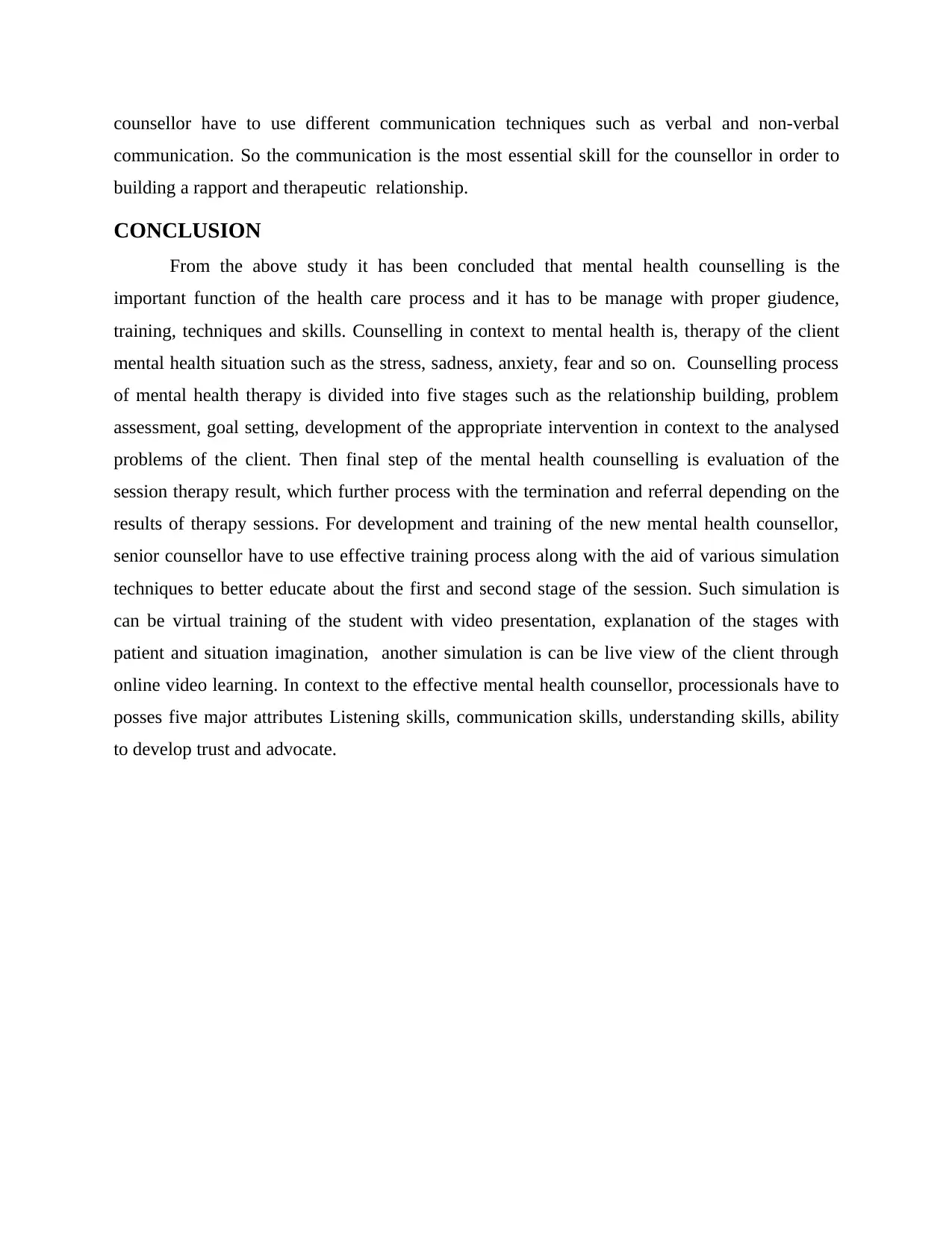
counsellor have to use different communication techniques such as verbal and non-verbal
communication. So the communication is the most essential skill for the counsellor in order to
building a rapport and therapeutic relationship.
CONCLUSION
From the above study it has been concluded that mental health counselling is the
important function of the health care process and it has to be manage with proper giudence,
training, techniques and skills. Counselling in context to mental health is, therapy of the client
mental health situation such as the stress, sadness, anxiety, fear and so on. Counselling process
of mental health therapy is divided into five stages such as the relationship building, problem
assessment, goal setting, development of the appropriate intervention in context to the analysed
problems of the client. Then final step of the mental health counselling is evaluation of the
session therapy result, which further process with the termination and referral depending on the
results of therapy sessions. For development and training of the new mental health counsellor,
senior counsellor have to use effective training process along with the aid of various simulation
techniques to better educate about the first and second stage of the session. Such simulation is
can be virtual training of the student with video presentation, explanation of the stages with
patient and situation imagination, another simulation is can be live view of the client through
online video learning. In context to the effective mental health counsellor, processionals have to
posses five major attributes Listening skills, communication skills, understanding skills, ability
to develop trust and advocate.
communication. So the communication is the most essential skill for the counsellor in order to
building a rapport and therapeutic relationship.
CONCLUSION
From the above study it has been concluded that mental health counselling is the
important function of the health care process and it has to be manage with proper giudence,
training, techniques and skills. Counselling in context to mental health is, therapy of the client
mental health situation such as the stress, sadness, anxiety, fear and so on. Counselling process
of mental health therapy is divided into five stages such as the relationship building, problem
assessment, goal setting, development of the appropriate intervention in context to the analysed
problems of the client. Then final step of the mental health counselling is evaluation of the
session therapy result, which further process with the termination and referral depending on the
results of therapy sessions. For development and training of the new mental health counsellor,
senior counsellor have to use effective training process along with the aid of various simulation
techniques to better educate about the first and second stage of the session. Such simulation is
can be virtual training of the student with video presentation, explanation of the stages with
patient and situation imagination, another simulation is can be live view of the client through
online video learning. In context to the effective mental health counsellor, processionals have to
posses five major attributes Listening skills, communication skills, understanding skills, ability
to develop trust and advocate.
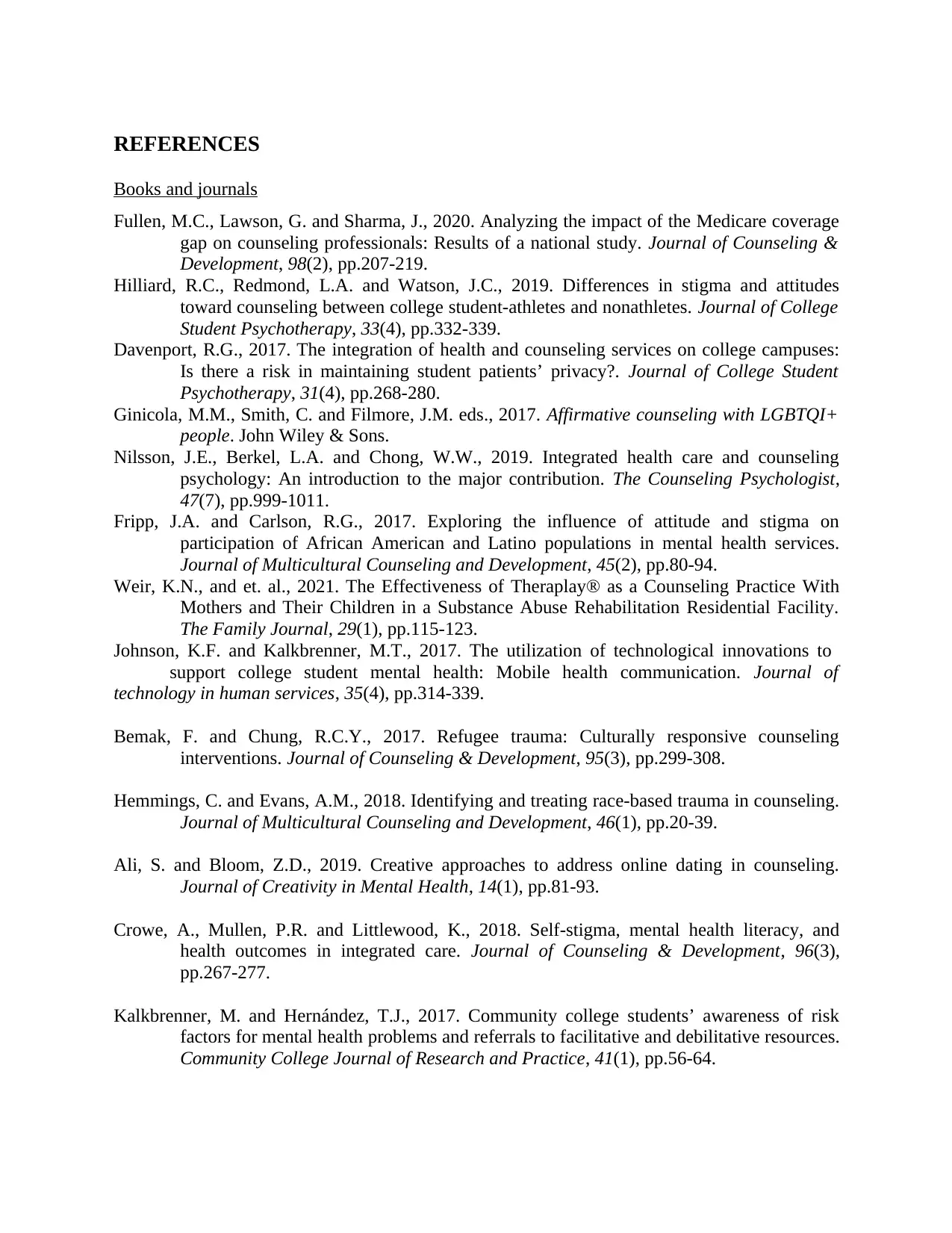
REFERENCES
Books and journals
Fullen, M.C., Lawson, G. and Sharma, J., 2020. Analyzing the impact of the Medicare coverage
gap on counseling professionals: Results of a national study. Journal of Counseling &
Development, 98(2), pp.207-219.
Hilliard, R.C., Redmond, L.A. and Watson, J.C., 2019. Differences in stigma and attitudes
toward counseling between college student-athletes and nonathletes. Journal of College
Student Psychotherapy, 33(4), pp.332-339.
Davenport, R.G., 2017. The integration of health and counseling services on college campuses:
Is there a risk in maintaining student patients’ privacy?. Journal of College Student
Psychotherapy, 31(4), pp.268-280.
Ginicola, M.M., Smith, C. and Filmore, J.M. eds., 2017. Affirmative counseling with LGBTQI+
people. John Wiley & Sons.
Nilsson, J.E., Berkel, L.A. and Chong, W.W., 2019. Integrated health care and counseling
psychology: An introduction to the major contribution. The Counseling Psychologist,
47(7), pp.999-1011.
Fripp, J.A. and Carlson, R.G., 2017. Exploring the influence of attitude and stigma on
participation of African American and Latino populations in mental health services.
Journal of Multicultural Counseling and Development, 45(2), pp.80-94.
Weir, K.N., and et. al., 2021. The Effectiveness of Theraplay® as a Counseling Practice With
Mothers and Their Children in a Substance Abuse Rehabilitation Residential Facility.
The Family Journal, 29(1), pp.115-123.
Johnson, K.F. and Kalkbrenner, M.T., 2017. The utilization of technological innovations to
support college student mental health: Mobile health communication. Journal of
technology in human services, 35(4), pp.314-339.
Bemak, F. and Chung, R.C.Y., 2017. Refugee trauma: Culturally responsive counseling
interventions. Journal of Counseling & Development, 95(3), pp.299-308.
Hemmings, C. and Evans, A.M., 2018. Identifying and treating race‐based trauma in counseling.
Journal of Multicultural Counseling and Development, 46(1), pp.20-39.
Ali, S. and Bloom, Z.D., 2019. Creative approaches to address online dating in counseling.
Journal of Creativity in Mental Health, 14(1), pp.81-93.
Crowe, A., Mullen, P.R. and Littlewood, K., 2018. Self‐stigma, mental health literacy, and
health outcomes in integrated care. Journal of Counseling & Development, 96(3),
pp.267-277.
Kalkbrenner, M. and Hernández, T.J., 2017. Community college students’ awareness of risk
factors for mental health problems and referrals to facilitative and debilitative resources.
Community College Journal of Research and Practice, 41(1), pp.56-64.
Books and journals
Fullen, M.C., Lawson, G. and Sharma, J., 2020. Analyzing the impact of the Medicare coverage
gap on counseling professionals: Results of a national study. Journal of Counseling &
Development, 98(2), pp.207-219.
Hilliard, R.C., Redmond, L.A. and Watson, J.C., 2019. Differences in stigma and attitudes
toward counseling between college student-athletes and nonathletes. Journal of College
Student Psychotherapy, 33(4), pp.332-339.
Davenport, R.G., 2017. The integration of health and counseling services on college campuses:
Is there a risk in maintaining student patients’ privacy?. Journal of College Student
Psychotherapy, 31(4), pp.268-280.
Ginicola, M.M., Smith, C. and Filmore, J.M. eds., 2017. Affirmative counseling with LGBTQI+
people. John Wiley & Sons.
Nilsson, J.E., Berkel, L.A. and Chong, W.W., 2019. Integrated health care and counseling
psychology: An introduction to the major contribution. The Counseling Psychologist,
47(7), pp.999-1011.
Fripp, J.A. and Carlson, R.G., 2017. Exploring the influence of attitude and stigma on
participation of African American and Latino populations in mental health services.
Journal of Multicultural Counseling and Development, 45(2), pp.80-94.
Weir, K.N., and et. al., 2021. The Effectiveness of Theraplay® as a Counseling Practice With
Mothers and Their Children in a Substance Abuse Rehabilitation Residential Facility.
The Family Journal, 29(1), pp.115-123.
Johnson, K.F. and Kalkbrenner, M.T., 2017. The utilization of technological innovations to
support college student mental health: Mobile health communication. Journal of
technology in human services, 35(4), pp.314-339.
Bemak, F. and Chung, R.C.Y., 2017. Refugee trauma: Culturally responsive counseling
interventions. Journal of Counseling & Development, 95(3), pp.299-308.
Hemmings, C. and Evans, A.M., 2018. Identifying and treating race‐based trauma in counseling.
Journal of Multicultural Counseling and Development, 46(1), pp.20-39.
Ali, S. and Bloom, Z.D., 2019. Creative approaches to address online dating in counseling.
Journal of Creativity in Mental Health, 14(1), pp.81-93.
Crowe, A., Mullen, P.R. and Littlewood, K., 2018. Self‐stigma, mental health literacy, and
health outcomes in integrated care. Journal of Counseling & Development, 96(3),
pp.267-277.
Kalkbrenner, M. and Hernández, T.J., 2017. Community college students’ awareness of risk
factors for mental health problems and referrals to facilitative and debilitative resources.
Community College Journal of Research and Practice, 41(1), pp.56-64.
Secure Best Marks with AI Grader
Need help grading? Try our AI Grader for instant feedback on your assignments.
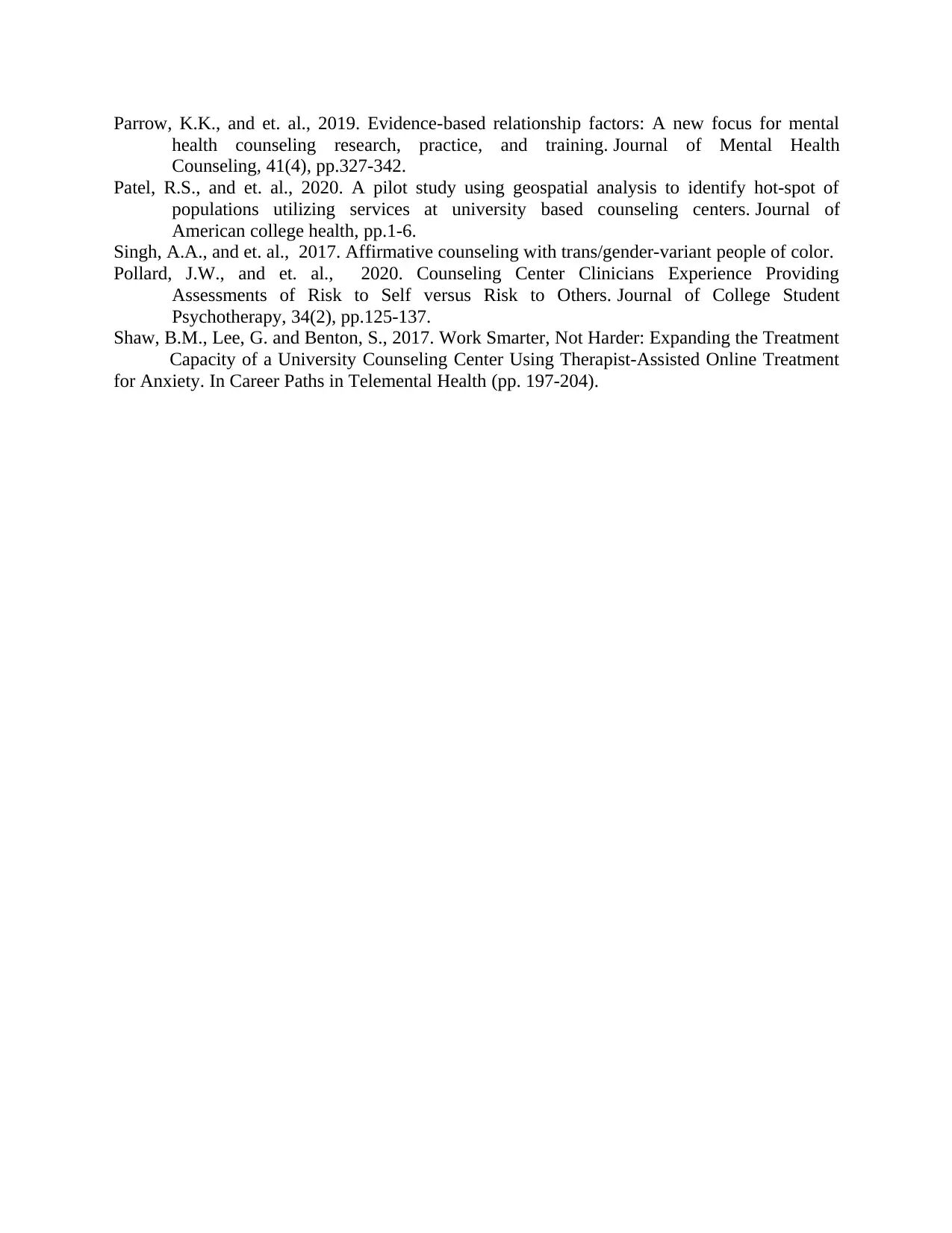
Parrow, K.K., and et. al., 2019. Evidence-based relationship factors: A new focus for mental
health counseling research, practice, and training. Journal of Mental Health
Counseling, 41(4), pp.327-342.
Patel, R.S., and et. al., 2020. A pilot study using geospatial analysis to identify hot-spot of
populations utilizing services at university based counseling centers. Journal of
American college health, pp.1-6.
Singh, A.A., and et. al., 2017. Affirmative counseling with trans/gender-variant people of color.
Pollard, J.W., and et. al., 2020. Counseling Center Clinicians Experience Providing
Assessments of Risk to Self versus Risk to Others. Journal of College Student
Psychotherapy, 34(2), pp.125-137.
Shaw, B.M., Lee, G. and Benton, S., 2017. Work Smarter, Not Harder: Expanding the Treatment
Capacity of a University Counseling Center Using Therapist-Assisted Online Treatment
for Anxiety. In Career Paths in Telemental Health (pp. 197-204).
health counseling research, practice, and training. Journal of Mental Health
Counseling, 41(4), pp.327-342.
Patel, R.S., and et. al., 2020. A pilot study using geospatial analysis to identify hot-spot of
populations utilizing services at university based counseling centers. Journal of
American college health, pp.1-6.
Singh, A.A., and et. al., 2017. Affirmative counseling with trans/gender-variant people of color.
Pollard, J.W., and et. al., 2020. Counseling Center Clinicians Experience Providing
Assessments of Risk to Self versus Risk to Others. Journal of College Student
Psychotherapy, 34(2), pp.125-137.
Shaw, B.M., Lee, G. and Benton, S., 2017. Work Smarter, Not Harder: Expanding the Treatment
Capacity of a University Counseling Center Using Therapist-Assisted Online Treatment
for Anxiety. In Career Paths in Telemental Health (pp. 197-204).
1 out of 11
Related Documents
Your All-in-One AI-Powered Toolkit for Academic Success.
+13062052269
info@desklib.com
Available 24*7 on WhatsApp / Email
![[object Object]](/_next/static/media/star-bottom.7253800d.svg)
Unlock your academic potential
© 2024 | Zucol Services PVT LTD | All rights reserved.





